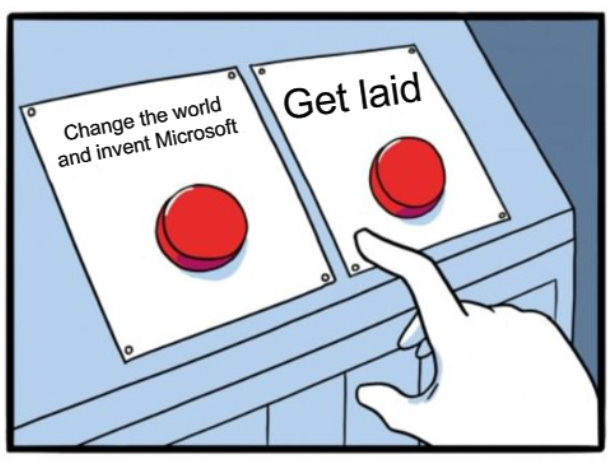You're sitting on your couch, binge-watching the latest season of The Mandalorian (good choice) when suddenly, a mysterious box appears on your Ring cam.
Intrigued, you notice there's a big, shiny button on top and a note that reads:
"Press the button, and you'll receive a million dollars. However, someone you don't know will die." What would you do?
Depending on your demographic, this story might sound a bit familiar.
If you’re youngish, it was the rough plot behind the 2009 psychological thriller called The Box.
If you’re a bit older, you might recognize it from one of the highest-rated episodes of the awesome sci-fi anthology rehashed series in 1986, The Twilight Zone.
If you’re even older—gasp—and hornier—double gasp—you might recognize it from Playboy, of all things, where they included a collection of short stories from author Richard Matheson.
In the original story, the main character Norma eventually decides to push the button, only to be devastated when her husband meets his demise in a train accident. She gets her money—$50,000—from a no-fault insurance settlement.
Overwhelmed with grief, she questions the stranger who gave her the box about why it was her husband who had to perish. The stranger enigmatically responds, "Did you truly believe you knew your husband?"
Nice touch on the ‘a stranger has to die thing.’ Yikes.
And don’t get any ideas, dear reader, no matter how much your spouse nags you about the dirty dishes.
But while the amounts may have changed from the stories over time, from $50,000 in 1970 to $200,000 in 1986 to $1 million in 2009 (Thanks, Reagonomics!), the moral of the story is the same:
Would you care if a complete stranger died in order for you to get rich?
The Billionaire's Burden
Let's face it, when you're raking in billions of dollars, chances are you're not making the world a better place for everyone.
Sure, thanks to Bezos (née Jeffrey Preston Jorgensen), we can order anything from fresh-cut tulips to giant bread body pillows right to our doorstep (sadly, no PB&Ts yet).
We can also partially thank Musk (née Elongated Muskrat ) for helping electric cars become more popular in America, where 7% of all new cars in January 2023 were using the new-fangled tech.¹
And, of course, chances are around 40% you’re reading this on an operating system only made possible because Gates (née William Henry Gates III) spent years in his rich parent’s basement coding instead of talking to human females.
But as a consequence, Amazon's monopoly and Prime program allegedly forces small businesses to pay high commission fees to access customers and offer free shipping, often putting them at a financial disadvantage, needing higher prices to cover these fees, and helping small businesses get boned all over the world.
(There’s a great writeup on this on , one of my favorite Substacks).
As for the environment-saving electric cars, they require tonnes of cobalt and lithium. Unfortunately for our morals, a lot of these are sourced from areas with no regulations.
Ones that would protect our air, our water, and our children—
“Of the 255,000 Congolese mining for cobalt, 40,000 are children, some as young as six years. Much of the work is informal small-scale mining in which laborers earn less than $2 per day while using their own tools, primarily their hands.”
And then there’s Microsoft Windows, which is pretty self-explanatory on how much harm it’s imparted on us.
What’s the point of all this ranting?
Getting rich comes with a price.
“Negative Externalities”
In economics, negative externalities occur when an individual or company's actions result in a negative effect on a third party, often without the responsible party bearing the full cost of their actions.
In the case of billionaires, the third party experiencing all of these negative effects is ALL OF US—and we have virtually no recourse to prevent it.
But this is an open secret.
You know it, I know it, and the new-age billionaires certainly do too. Why do you think so many of them have become some sort of nouveau freakish ultra-rich doomsday preppers?
The wealthy individuals in the above link seek ultra-luxury isolation and respite from the very problems their individualism and escapism helped create in the first place!
They built the Titanic, steered it into an iceberg, stole the lifeboats, and as they drift off into the distance of our combined future, their voices faintly echo, “This is all your fault!”
But don’t worry, I’m sure these preppy prepper pricks will absolutely love their future years post-apocalypse sipping on their unreplicable Dom Pérignon in-between gulps of recycled air on their yachts.
In the Mirror
But hey, maybe I’m too quick to blame.
After all, it’s not like I actually have a button to press to give me $1 billion tomorrow. But—trust me—I wish the blue ‘Publish’ button above this draft did have that ability.
The philosophical button from the story isn’t real, nor is it binary.
For wealth is a scale, and so are, in many ways, our morals. I personally can’t say for sure which rocks I’d die on or let crumble as more money beckoned me.
What about you?
Would you give up your favorite hobby to work more hours, earning an extra $500 a month?
Would you relocate to a less desirable city with a lower cost of living if it meant saving $1,000 a month and increasing your wealth over time?
Would you take a big promotion at work knowing your co-workers are far more suitable?
Would you invest in an extremely controversial but highly profitable industry just to earn a higher investment on your 401(k)?
Would you withhold benefits or cut salaries for your employees to increase your company's profits this year, knowing you’re retiring next year and would get a fat bonus?
Would you lobby for policies that primarily benefit the rich at the expense of the poor, if it paid you $10 million a year?
Would you screw the concept of democracy around the entire world because you’re the worst thing to come out of Australia since vegemite?
These are all questions individuals have and will face.
But which button they press is the mystery, and likely tied in with a vast number of factors from how they grew up, the society they live in, and a concept that seems to be ever-so fleeting in our modern world—empathy.
They now say happiness increases with earnings all the way up to around $500,000. And since the $1 million from the movie at the beginning can’t even get you a parking space in some cities, let’s just say the button gives $10 million.
But remember, if it’s hit, somewhere, sometime, some stranger dies as a result.
So, if given the chance, would you press the button?
Because These Guys Sure Did
Around 6,000,000 die prematurely from smoking every year while the tobacco industry pulls in $35 billion in profits. Their button only pays $4,375 per death—yet they still smash it.
11,000,000 people die prematurely from eating junk food every year, and the fast food industry makes around $51 billion from it. Their button costs $4,600, what a tasty treat.
More than 564,000 people died from the opioid epidemic, while the Sackler family (who owned Purdue Pharma) made $12 billion in profits. Their button cost $21,277, and they hit it, pain-free.
45,000 people die from gun deaths in the US, while the gun industry makes around $2.142 billion from it. Their button is a cool $47,600, and they bang away on it.
8,000,000 people die annually from fossil fuel air pollution while the oil and gas industry pulls in more than $1 trillion in profits. Their button pays a more respectable $125,000 per death, but they don’t choke when it comes time to press it.
Around 40,000 people die in the US every year from homelessness, which Elon Musk promised to solve by spending $6 billion (2% of his fortune at the time). Instead, he ruined Twitter. His faux-promise-button press comes in at $150,000 per death—and his ego has never been more fulfilled.
Written by a buttonless JJ Pryor.
👇Click the heart thingy? The algorithm loves it. I love it more.👇
Notes:
I honestly that would be higher by now. Progress takes time I guess.
Original image credit goes to Jake Clark on Tumblr. His meme is now famous all over the internet. Good for you, Jake.






That was pretty thought provoking.
Where I live, we're not driven crazy by crowding, so the primary effect of guns is to melt down and compact junk plastic before it's recycled. On the other hand, glyphosate is actually harming me. Nobody ever mentions the profiteering on glyphosate, because they've seen that it's an unprofitable topic to mention. People just keep screaming about the guns.
Free fun fact: The only death from gun violence among people I know was part of the massacre known as the D.C. gun ban. In 1983 I thought the ban would save lives.